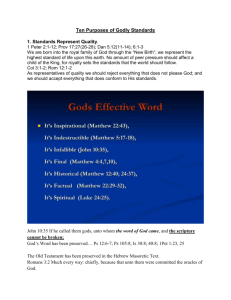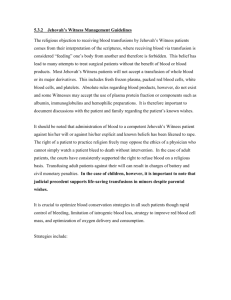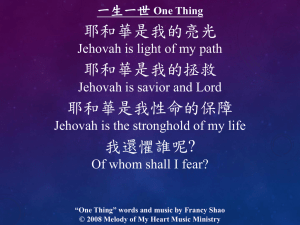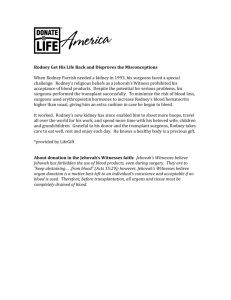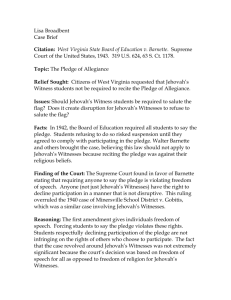Jehovah - Eagle's Haven Church
advertisement
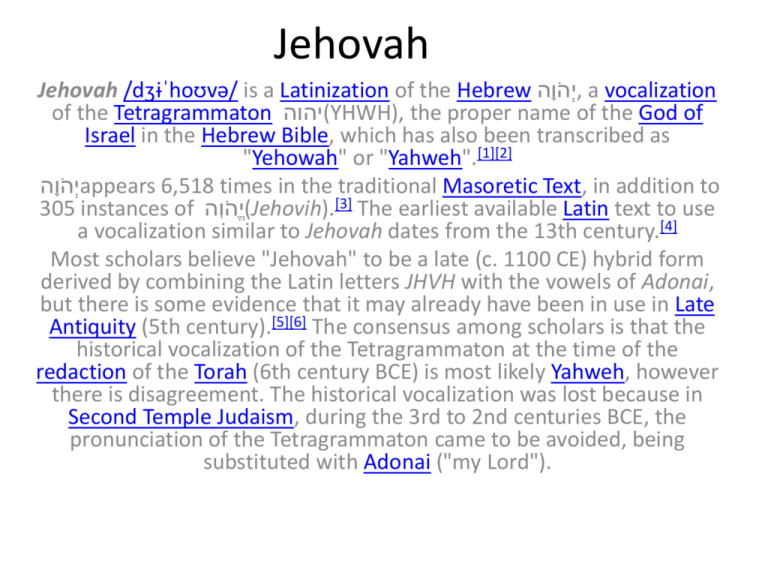
Jehovah Jehovah /dʒɨˈhoʊvə/ is a Latinization of the Hebrew יְהֹ וָה, a vocalization of the Tetragrammaton (יהוהYHWH), the proper name of the God of Israel in the Hebrew Bible, which has also been transcribed as "Yehowah" or "Yahweh".[1][2] יְהֹ וָהappears 6,518 times in the traditional Masoretic Text, in addition to 305 instances of (יֱהֹ וִהJehovih).[3] The earliest available Latin text to use a vocalization similar to Jehovah dates from the 13th century.[4] Most scholars believe "Jehovah" to be a late (c. 1100 CE) hybrid form derived by combining the Latin letters JHVH with the vowels of Adonai, but there is some evidence that it may already have been in use in Late Antiquity (5th century).[5][6] The consensus among scholars is that the historical vocalization of the Tetragrammaton at the time of the redaction of the Torah (6th century BCE) is most likely Yahweh, however there is disagreement. The historical vocalization was lost because in Second Temple Judaism, during the 3rd to 2nd centuries BCE, the pronunciation of the Tetragrammaton came to be avoided, being substituted with Adonai ("my Lord"). Pronunciation The name Iehova at a Norwegian church.[7] Most scholars believe "Jehovah" to be a late (c. 1100 CE) hybrid form derived by combining the Latin letters JHVH with the vowels of Adonai, but some hold there is evidence that the Jehovah form of the Tetragrammaton may have been in use in Semitic and Greek phonetic texts and artifacts from Late Antiquity.[5][6] Others say that it is the pronunciation Yahweh that is testified in both Christian and pagan texts of the early Christian era.[5][8][9][10][11] Karaite Jews,[12] as proponents of the rendering Jehovah, state that although the original pronunciation of יהוהhas been obscured by disuse of the spoken name according to oral Rabbinic law, well-established English transliterations of other Hebrew personal names are accepted in normal usage, such as Joshua, Isaiah or Jesus, for which the original pronunciations may be unknown.[12] They also point out that "the English form Jehovah is quite simply an Anglicized form of Yehovah,"[12] and preserves the four Hebrew consonants "YHVH" (with the introduction of the "J" sound in English).[12][13][14] Some argue that Jehovah is preferable to Yahweh, based on their conclusion that the Tetragrammaton was likely tri-syllabic originally, and that modern forms should therefore also have three syllables.[15] According to a Jewish tradition developed during the 3rd to 2nd centuries BCE, the Tetragrammaton is written but not pronounced. When read, substitute terms replace the divine name where יְהֹ וָהappears in the text. It is widely assumed, as proposed by the 19thcentury Hebrew scholar Gesenius, that the vowels of the substitutes of the name—Adonai (Lord) and Elohim (God)—were inserted by the Masoretes to indicate that these substitutes were to be used.[16] When יהוהprecedes or follows Adonai, the Masoretes placed the vowel points of Elohim into the Tetragrammaton, producing a different vocalization of the Tetragrammaton יֱהֹ וִה, which was read as Elohim.[17] Based on this reasoning, the form (יְהֹ וָהJehovah) has been characterized by some as a "hybrid form",[5][18] and even "a philological impossibility".[19] Early modern translators disregarded the practice of reading Adonai (or its equivalents in Greek and Latin, Κύριος and Dominus)[20] in place of the Tetragrammaton and instead combined the four Hebrew letters of the Tetragrammaton with the vowel points that, except in synagogue scrolls, accompanied them, resulting in the form Jehovah.[21] This form, which first took effect in works dated 1278 and 1303, was adopted in Tyndale's and some other Protestant translations of the Bible.[22] In the 1611 King James Version, Jehovah occurred seven times.[23] In the 1885 English Revised Version, the form "Jehovah" occurs twelve times. In the 1901 American Standard Version the form "Je-ho’vah" became the regular English rendering of the Hebrew יהוה, all throughout, in preference to the previously dominant "the LORD", which is generally used in the King James Version.[2 Development The most widespread theory is that the Hebrew term יְהֹ וָהhas the vowel points of אֲ ֹדנָי (adonai). Using the vowels of adonai, the composite hataf patah ֲunder the guttural alef א becomes a sheva ְunder the yod ,יthe holam ֹis placed over the first he ,הand the qamats ָis placed under the vav ,וgiving ( יְהֹ וָהJehovah). When the two names, יהוהand ,אדני occur together, the former is pointed with a hataf segol ֱunder the yod יand a hiriq ִunder the second he ,הgiving ,יֱהֹ וִהto indicate that it is to be read as (elohim) in order to avoid adonai being repeated.[26] A 1552 Latin translation of the Sefer Yetzirah, using the form Iehouah for the "magnum Nomen tetragrammatum". The pronunciation Jehovah is believed to have arisen through the introduction of vowels of the qere—the marginal notation used by the Masoretes. In places where the consonants of the text to be read (the qere) differed from the consonants of the written text (the kethib), they wrote the qere in the margin to indicate that the kethib was read using the vowels of the qere. For a few very frequent words the marginal note was omitted, referred to as q're perpetuum.[19] One of these frequent cases was God's name, which was not to be pronounced in fear of profaning the "ineffable name". Instead, wherever ( יהוהYHWH) appears in the kethib of the biblical and liturgical books, it was to be read as ( אֲ ֹדנָיadonai, "My Lord [plural of majesty]"), or as ( ֹלהים ִ ֱאelohim, "God") if adonai appears next to it.[citation needed] This combination produces ( יְהֹ וָהyehovah) and ( יֱהֹ וִהyehovih) respectively.[citation needed] יהוהis also written ’ ,הor even ’ ,דand read ha-Shem ("the name").[26] Scholars are not in total agreement as to why יְהֹ וָהdoes not have precisely the same vowel points as adonai.[citation needed] The use of the composite hataf segol ֱin cases where the name is to be read, "elohim", has led to the opinion that the composite hataf patah ֲought to have been used to indicate the reading, "adonai". It has been argued conversely that the disuse of the patah is consistent with the Babylonian system, in which the composite is uncommon Vowel points of יְהֹ וָהand אֲ ֹדנָי The spelling of the Tetragrammaton and connected forms in the Hebrew Masoretic text of the Bible, with vowel points shown in red. The table below shows the vowel points of Yehovah and Adonay, indicating the simple sheva in Yehovah in contrast to the hataf patah in Adonay. As indicated to the right, the vowel points used when YHWH is intended to be pronounced as Adonai are slightly different to those used in Adonai itself. A 1552 Latin translation of the Sefer Yetzirah, using the form Iehouah for the "magnum Nomen tetragrammatum". The difference between the vowel points of ’ǎdônây and YHWH is explained by the rules of Hebrew morphology and phonetics. Sheva and hataf-patah were allophones of the same phoneme used in different situations: hataf-patah on glottal consonants including aleph (such as the first letter in Adonai), and simple sheva on other consonants (such as the Y in YHWH).[27] Introduction into English The "peculiar, special, honorable and most blessed name of God" Iehoua, an older English form of Jehovah (Roger Hutchinson, The image of God, 1550) The Brown-Driver-Briggs Lexicon suggested that the pronunciation Jehovah was unknown until 1520 when it was introduced by Galatinus, who defended its use. In English it appeared in William Tyndale's translation of the Pentateuch ("The Five Books of Moses"),[28] published in 1530 in Germany, where Tyndale had studied since 1524, possibly in one or more of the universities at Wittenberg, Worms and Marburg, where Hebrew was taught.[29] The spelling used by Tyndale was "Iehouah"; at that time, "I" was not distinguished from J, and U was not distinguished from V.[30] The original 1611 printing of the Authorized King James Version used "Iehovah". Tyndale wrote about the divine name: "IEHOUAH [Jehovah], is God's name; neither is any creature so called; and it is as much to say as, One that is of himself, and dependeth of nothing. Moreover, as oft as thou seest LORD in great letters (except there be any error in the printing), it is in Hebrew Iehouah, Thou that art; or, He that is."[31] The name is also found in a 1651 edition of Ramón Martí's Pugio fidei.[32] or Catholic known as; Raymundus Martini The name Jehovah appeared in all early Protestant Bibles in English, except Coverdale's translation in 1535.[33] The Roman Catholic Douay-Rheims Bible used "the Lord", corresponding to the Latin Vulgate's use of "Dominus" (Latin for "Adonai", "Lord") to represent the Tetragrammaton. The Authorized King James Version also, which used "Jehovah" in a few places, most frequently gave "the LORD" as the equivalent of the Tetragrammaton. The name Jehovah appeared in John Rogers' Matthew Bible in 1537, the Great Bible of 1539, the Geneva Bible of 1560, Bishop's Bible of 1568 and the King James Version of 1611. More recently, it has been used in the Revised Version of 1885, the American Standard Version in 1901, and the New World Translation of the Holy Scriptures of Jehovah's Witnesses in 1961. At Exodus 6:3-6, where the King James Version has Jehovah, the Revised Standard Version (1952),[34] the New American Standard Bible (1971), the New International Version (1978), the New King James Version (1982), the New Revised Standard Version (1989), the New Century Version (1991), and the Contemporary English Version (1995) give "LORD" or "Lord" as their rendering of the Tetragrammaton, while the New Jerusalem Bible (1985), the Amplified Bible (1987), the New Living Translation (1996, revised 2007), the English Standard Version (2001), and the Holman Christian Standard Bible (2004) use the form Yahweh.



